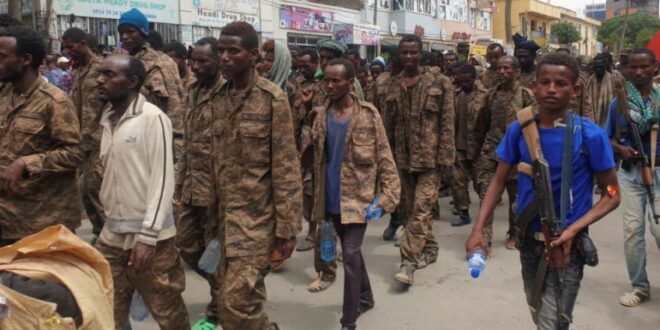The mobilisation follows Prime Minister Abiy Ahmed’s warning that his forces would repel any attacks by their enemies.
Three Ethiopian regions previously untouched by the war in Tigray confirmed on Thursday that they were deploying forces to back military operations there, signalling a potential widening of the conflict.
The reinforcements are coming from Oromia – Ethiopia’s largest region – as well as the Sidama region and Southern Nations, Nationalities and Peoples’ Region (SNNPR), according to official statements and state media reports.
The mobilisation follows Prime Minister Abiy Ahmed’s warning on Wednesday that his forces would repel any attacks by their enemies, effectively tearing up a government-declared ceasefire on June 28.
“Oromia and Sidama regional special forces have moved towards the front line. The Sidama special forces have arrived at the front line,” state-affiliated Fana Broadcasting Corporate reported, adding that SNNPR forces had arrived as well.
Abiy sent troops into Tigray last November, saying the move came in response to an assault on federal army camps ordered by the region’s ruling party, the Tigray People’s Liberation Front (TPLF).
The prime minister, a 2019 Nobel Peace Prize winner, declared victory in late November, but fighting persisted and TPLF leaders remained on the run.
Then the war took a stunning turn in late June when rebels retook the Tigray capital Mekelle and Abiy declared a unilateral ceasefire, pulling most troops from the region.
This week the rebels – who have rebranded as the Tigray Defence Forces (TDF) – launched a new offensive intended to drive ethnic Amhara forces off disputed territory in western and southern Tigray.
In response, Amhara security forces and militias have mobilised en masse, and a spokesman for that region, Gizachew Muluneh, said on Wednesday it was shifting to “attack” mode to reverse the rebels’ battlefield gains.
‘Stand united’
AFP journalists who on Wednesday visited the town of Adi Arkay, near the Amhara-Tigray border, saw thousands of newly mobilised Amhara fighters awaiting orders to advance.
Officials in northern Amhara said they feared TDF fighters wanted to push south towards Addis Ababa and topple the government.
Oromia President Shimeles Abdisa said at a press conference that Tigrayan leaders wanted to “destabilise” the entire country.
“We condemn in the strongest terms possible those who are working hard to revitalise this terrorist group. We should stand united to do whatever it takes to incapacitate it,” Shimeles said.
TDF spokesman Getachew Reda declared this week that the force would “liberate every square inch of Tigray”.
Two days after the TDF took Mekelle, he told AFP that its forces were prepared to march on Addis Ababa if that were necessary “to secure Tigray”.
It was not clear on Thursday how many troops from the various regions were being sent towards Tigray. Tens of thousands have died and about two million people have been displaced.
The war, characterised by grisly massacres and rampant sexual violence, has damaged Abiy’s standing as a reformer and peacemaker, and badly strained Ethiopia’s ties with traditional allies.
Western powers have demanded the ceasefire be accompanied by unfettered aid access and the withdrawal of Eritrean troops, warning of possible sanctions should these conditions not be met.
The World Food Programme said this week that it had reached Mekelle with food supplies but far more was needed to address the massive need in a region where the United Nations says famine conditions are already present.
 Eurasia Press & News
Eurasia Press & News



